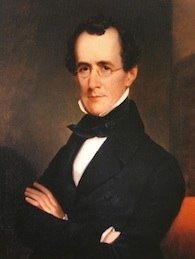
John Williamson Nevin
What is “the anxious bench,” and why was John Williamson Nevin so critical of it? On this episode of 5 Minutes in Church History, Dr. Stephen Nichols looks at the life and legacy of this 19th-century theologian.
Today’s episode is on location at Franklin & Marshall College in Lancaster, Pennsylvania. There was a very important figure from nineteenth-century American Christianity who served as the president of this college for ten years from 1866 to 1876. That person was John Williamson Nevin.
 John Williamson Nevin was born on February 20, 1803. He died on June 6, 1886. His life spanned almost the entirety of the nineteenth century. He was an important figure who was involved in a number of the significant moments of nineteenth-century American Christianity. His mother’s side of the family, the Williamson’s, were old Scottish Presbyterian, so Nevin was born into a Presbyterian home. He studied at Union College up in New York. It was there that he was led to Christ by the revival efforts of Asahel Nettleton. Nettleton was a very significant figure in the Second Great Awakening, and he preached a series of revivals there in Union. So, as a college student, Nevin had his conversion experience.
John Williamson Nevin was born on February 20, 1803. He died on June 6, 1886. His life spanned almost the entirety of the nineteenth century. He was an important figure who was involved in a number of the significant moments of nineteenth-century American Christianity. His mother’s side of the family, the Williamson’s, were old Scottish Presbyterian, so Nevin was born into a Presbyterian home. He studied at Union College up in New York. It was there that he was led to Christ by the revival efforts of Asahel Nettleton. Nettleton was a very significant figure in the Second Great Awakening, and he preached a series of revivals there in Union. So, as a college student, Nevin had his conversion experience.
He studied at Princeton Theological Seminary from 1823 to 1828. He studied under the original faculty of Princeton Seminary. He studied under Archibald Alexander, Samuel Miller, and—of course—Charles Hodge. It was actually while he was at Princeton that Nevin wrote and delivered his first book titled An Address on Sacred Music, published in 1827. After his time at Princeton Seminary, he went to Western Theological Seminary. Now, it is called Pittsburgh Theological Seminary. We have to remember, in those days—only twenty years after the expedition of Lewis and Clark—Pittsburgh was sort of the Western border as it were, so it was called Western Theological Seminary.
While he was teaching there, he began to move away from American Presbyterianism to the German Reformed Church. He left his post at Western Seminary and went to the German Reformed seminary at Mercersburg, Pennsylvania. He taught alongside Phillip Schaff, and Nevin and Schaff founded what has been called the “Mercersburg Theology.” Nevin would marry a woman named Martha Jenkins who was from a family that owned a forge, and this would factor significantly into Nevin’s life.
At the time of his marriage, Nevin was still teaching at Mercersburg and writing books. He wrote a very significant book in 1843 titled The Anxious Bench: A Tract for Our Times. This book served as a criticism of Charles Grandison Finney and what he called “new measures” for revival. One of Finney’s “new measures” was the anxious bench. The anxious bench was a bench where people at revivals would come and sit in order to be directly preached to by a revivalist, where they would confess their sins and accept Christ as Savior. This has now become a bit of a staple in American Christianity in the form of the altar call, but it was originally a “new measure” initiated and instituted by Finney in the nineteenth century. Nevin was critiquing this practice of the anxious bench in his book, The Anxious Bench: A Tract for Our Times.
Meanwhile, Nevin would leave Mercersburg and move to Lancaster County in Pennsylvania. His wife’s family had a forge named Windsor Forge, and for two years in the 1850s, 1856 to 1858, Nevin was the foreman supervisor of this grand estate and forge. Later, he was appointed professor at Franklin & Marshall College in Lancaster. He taught history from 1861 to 1866, and in 1866, he became president of Franklin & Marshall College.
He moved from his home at Windsor Forge and built a house in Lancaster called the “Carnarvon Place.” His next-door neighbor was none other than James Buchanan, the former President of the United States. Nevin retired from his presidency at Franklin & Marshall in 1876 and lived for another ten years in his retirement. He died on June 6, 1886.
Stay connected with 5 Minutes in Church History by getting the weekly podcast on iTunes, SoundCloud, or via RSS. You can also subscribe to the blog via RSS and follow us on Twitter and Facebook.
(This podcast is by Ligonier Ministries. Discovered by Christian Podcast Central and our community — copyright is owned by the publisher, not Christian Podcast Central, and audio is streamed directly from their servers.)